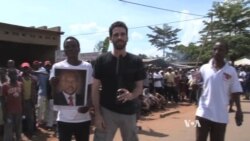Burundi President Pierre Nkurunziza on Friday thanked his security forces for stopping a military coup against his government.
Nkurunziza made the comments in a radio address after returning to the capital, Bujumbura, in a motorcade that was cheered by thousands of supporters lining the streets.
He also warned protesters to stop their demonstrations against his decision to seek a third term.
Nkurunziza said that there is now peace in the country and that those who wish for violence will not succeed.
A relative calm returned to the capital Friday after two days of violence between rival army factions. However, activists called for more demonstrations against the president.
The United States on Friday said Nkurunziza should not stand for a third term. U.S. Assistant Secretary of State Linda Thomas-Greenfield told VOA that the decision had caused instability in the country.
"What we are seeing now is a strong, strong reaction to his decision to pursue a third term, and in the interest of stability in the country, in the interest of moving Burundi forward and not allowing Burundi to go backward, we have encouraged that the president not pursue a third term," she said.
Earlier Friday, authorities in Burundi said they had arrested three people in connection with Wednesday's attempted coup. A presidential spokesman, Willy Nyamitwe, told VOA's Gabe Joselow that the leader of the coup attempt, General Godefroid Niyombare, remained at large and was believed to be in hiding.
Factbox: Burundi
Burundi
Independence: July 1, 1962, from U.N. trusteeship under Belgian administration
Location: Central Africa; borders Democratic Republic of the Congo, Rwanda, Tanzania
Size: 27,830 square kilometers (17,292 square miles); worldwide, ranks 147th in size
Population: 10,395,931 (July 2014 est.)
Capital: Bujumbura; population, 707,000 (2014 est.)
President: Pierre Nkurunziza, took office August 26, 2005
Term limits: Burundi's existing political structures were founded on the 2000 Arusha agreement, which brought to an end the civil war between Hutu and Tutsi factions that had killed up to 300,000 people.
That agreement states the president can serve no more than two terms in office. But the 2005 constitution states the president must be elected through “universal direct suffrage” – interpreted to mean a popular vote. Nkurunziza was elected by parliament to his first term, so, his supporters argue, he is eligible to run again.
Protests: Protests began in April, after supporters of Nkurunziza urged him to run for a third term; elections are scheduled for June 26. The demonstrations have turned violent, with the government reporting at least 14 deaths as of May 12.
Source: CIA World Factbook
Nyamitwe identified the three men arrested as Hillaire Nimenya, former director-general of police; Cyrille Ndayirukiye, former minister of defense; and pro-coup spokesman Zeno Ndabaneze.
Nkurunziza was in Tanzania for a regional summit on Burundi's political situation when Niyombare announced the coup attempt.
The leaders of the coup acknowledged late Thursday that their attempt had failed. Ndayirukiye said the movement had been overpowered by forces loyal to the president.
U.N. Secretary-General Ban Ki-moon expressed concern Friday about possible revenge attacks following the failed coup.
A spokesman for Ban said the U.N. chief spoke by phone with Kenyan President Uhuru Kenyatta to mobilize regional leaders to help end the crisis. He said Ban also expected to speak with Nkurunziza in the coming days.
The United Nations says more than 105,000 people have fled from Burundi and gone to Tanzania, Rwanda, and the Democratic Republic of Congo since Burundi's unrest began three weeks ago.
The president's decision to seek a third term sparked daily protests in Bujumbura and clashes between demonstrators and police that left at least 14 people dead and more than 200 wounded.
Critics of the president say a third term would be unconstitutional. The president and his supporters argue that a third term is permitted because he was elected by parliament, not voters, for his first five-year term in 2005. Burundi's constitutional court has sided with the president.












